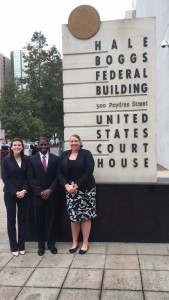PILS Auction and Faculty Lip Sync Battle
 Join the Law School community this Friday February 19 at the 23rd Annual Howard B. Eisenberg Do-Gooders’ Auction in support of the Public Interest Law Society. Festivities begin at 5:30 pm in Eckstein Hall and all proceeds support law students pursuing fellowships in public interest law. In addition to the ever popular live auction, this year’s event will include a faculty lip sync battle. Come cheer on Professors Fallone, Grossman and Schneider as they dance and fake sing their way into your hearts.
Join the Law School community this Friday February 19 at the 23rd Annual Howard B. Eisenberg Do-Gooders’ Auction in support of the Public Interest Law Society. Festivities begin at 5:30 pm in Eckstein Hall and all proceeds support law students pursuing fellowships in public interest law. In addition to the ever popular live auction, this year’s event will include a faculty lip sync battle. Come cheer on Professors Fallone, Grossman and Schneider as they dance and fake sing their way into your hearts.

